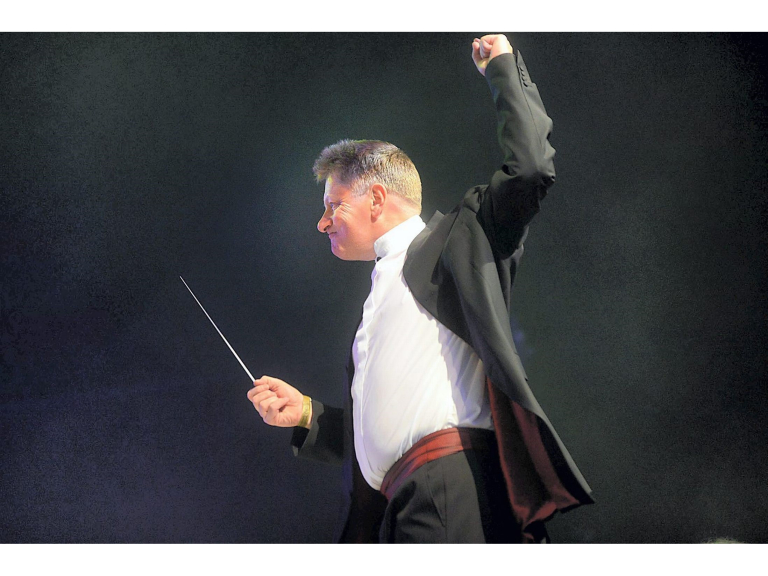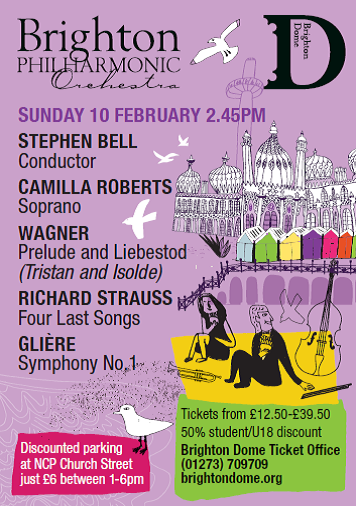
In the first half of our second concert of 2019 we visit two amazing talents of the late Romantic era - two German composers who changed the face not only of Romanticism, but the sound and energy of the orchestra. Two Richards, Wagner and Strauss, who were two of the most influential composers of the century. We welcome back Stephen Bell to conduct this unashamedly Romantic programme.
When you listen to Wagner, and especially the Prelude and Liebestod from Tristan and Isolde, you are drawn into an amazing orchestral world of colour, sound and brilliance. Wagner was born in 1813 - he was 14 when Beethoven died - and to put this into context Brahms was born in 1833 and died in 1897. Wagner himself died in 1883. So Germany had within its midst two colossal composers working in parallel universes – in an amazing few years of composition Wagner had written a collection of ground breaking operas including the Ring cycle - an amazing feat considering he wrote the librettos as well! The Prelude and Liebestod was written and performed a few years before Wagner completed the opera in 1865.
The Four Last Songs by Richard Strauss are probably the most poignant and heartfelt songs for soprano and orchestra ever written, and culminate an incredible journey of composition by Strauss – he knew as he wrote these songs that they would be the last pieces he would compose. There are four songs in the cycle: Frühling (Spring), September, Beim Schlafengehen (When Falling Asleep) and Im Abendrot (At Sunset). The poem At Sunset was written by Joseph Freiherr von Eichendorff; the other poems were written by Hermann Hesse. The songs’ first performance was given at the Royal Albert Hall in 1850, two years after the composer’s death aged 85. The songs other than Spring dwell on death and the eventual journey and are full of soaring melodies for soprano and orchestra. All the songs create a sense of immense calm and acceptance, and Strauss, the master orchestrator, creates this with poignant melody and orchestral solos in this masterclass of orchestration. We are delighted to welcome the soprano Camilla Roberts who will join Stephen Bell and the orchestra in these beautiful songs.
For the second half of this concert we travel to Russia and meet a highly talented composer hugely influenced by the folk songs of his native Russia. Reinhold Glière, although not a household name now, was an extraordinarily gifted composition student at the Moscow Conservatoire at the dawn of the 20th century. Glière composed this brilliantly crafted symphony, full of vibrant tunes and stunning harmony, at the age 25 and it was hugely popular in its day. A loyal Russian, he kept out of the politics of the time and was an enormously influential teacher of composition – the young Prokofiev being one of his pupils. Written in four movements it is unashamedly Romantic in its construction, and Glière keeps very close to the classical symphonic form.
This concert will be dedicated to the memory of one of the Brighton Philharmonic Orchestra’s most popular violinists Melanie Hornsby, who sadly lost her fight with cancer in the summer of last year – we would also like to say a huge thank you to the Macmillan Nurses who cared so brilliantly for her at the end of her life.

Issued for and on behalf of Brighton Philharmonic Orchestra
The following Cookies are used on this Site. Users who allow all the Cookies will enjoy the best experience and all functionality on the Site will be available to you.
You can choose to disable any of the Cookies by un-ticking the box below but if you do so your experience with the Site is likely to be diminished.
In order to interact with this site.
To help us to measure how users interact with content and pages on the Site so we can make
things better.
To show content from Google Maps.
To show content from YouTube.
To show content from Vimeo.
To share content across multiple platforms.
To view and book events.
To show user avatars and twitter feeds.
To show content from TourMkr.
To interact with Facebook.
To show content from WalkInto.